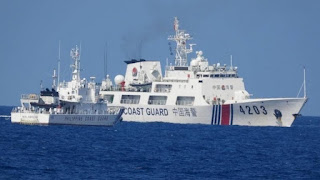In a recent incident that has sparked international concern, the Philippine Coast Guard (PCG) has accused the Chinese Coast Guard of firing water cannon at its vessels and obstructing their movement in the disputed South China Sea. The altercation occurred while the PCG's ship was escorting boats carrying supplies for Filipino soldiers stationed on one of the contested Spratly Islands. This development highlights the ongoing territorial disputes in the region, with China claiming a vast portion of the South China Sea, including the Spratly Islands.
China's Aggressive Actions: A Cause for Alarm
The Philippine Coast Guard reported that the incident took place as its vessels were en route to Second Thomas Shoal in the Spratly Islands. China's actions have been characterized by the PCG as "excessive and unlawful," going against international law. This is not the first time such aggressive actions have been observed; a BBC team aboard a PCG ship previously witnessed similar harassment from Chinese vessels in April.
International Outcry: US and Global Response
The United States was quick to condemn China's actions, labeling them as "dangerous." Notably, the US Department of State expressed its unwavering support for its Philippine allies. The department's statement condemned the use of water cannons and dangerous maneuvers by China's ships, stressing that these actions interfered with the lawful freedom of navigation of the Philippine vessels, thereby endangering their safety.
Complex Territorial Disputes
The South China Sea remains a contentious area due to conflicting territorial claims by multiple nations. China asserts its sovereignty over the majority of the sea, challenging international arbitration rulings that have deemed its claims invalid. Alongside China and the Philippines, Malaysia, Vietnam, Brunei, and Taiwan also have competing claims in the region.
Geopolitical Significance and Economic Implications
The South China Sea is now a global flashpoint, particularly as tensions between the United States and China continue to escalate. The region's significance extends beyond territorial disputes, as access to these waters holds strategic importance, especially in terms of defending Taiwan. With China's growing claims over Taiwan, the South China Sea has gained added geopolitical significance.
Moreover, the sea's waterways facilitate approximately $5 trillion of global trade annually. Concerns have been raised about China's expanding presence potentially hindering the free flow of commerce through the region. As the world watches these developments, the delicate balance between territorial sovereignty, freedom of navigation, and economic interests remains at the forefront of international discussions.
Conclusion,
The recent incident involving the Philippine Coast Guard and China's aggressive actions in the South China Sea underscores the complexity of geopolitical rivalries and territorial disputes in the region. As the Philippines and other nations continue to assert their claims, the world watches closely, aware of the implications these events hold for international relations, regional stability, and global trade. The South China Sea's status as a geopolitical hotspot underscores the need for diplomatic efforts to address these disputes and maintain a peaceful coexistence in the region.




